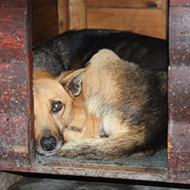Urgent appeal after flooding destroys dog shelter

Mdzananda Animal Clinic has been devastated by flooding.
A homeless dog shelter in Cape Town, South Africa, is pleading for public support after being hit by severe flooding.
When a devastating rainstorm struck the country last week, the Mdzananda Animal Clinic had no choice but to relocate all of its dogs from the flooded shelter to their small hospital cages.
On top of the flooding, the hospital is also said to be running at full capacity. Puppies are arriving at its doors suffering from hypothermia or injuries sustained from cars driving badly in the rain.
“It’s only the start of winter and the pets are already struggling,” explained Marcelle du Plessis, fundraising and communication manager. "Just last week, we found a 10-year-old dog wandering the streets in the rain. His feet were worn down, and his joints painful from arthritis. He had no hair on his back and was covered in fleas.
“We looked for his owners but couldn’t find them. We named him OG. OG received warm food, a soft bed and medication for his pain. But when the shelter flooded, we had to urgently make space for OG and the other dogs in our hospital unit.”
The charity urgently needs to upgrade its shelter unit to prevent future flooding and ensure that its dogs have a warm place to stay until they can find a permanent home. This upgrade alone is expected to cost just shy of R100 000 (around £5,000).
“We did not expect that we’d need to do such an upgrade,” said Du Plessis. “Winter comes with increased expenses too. Our electricity goes up by 50 per cent to keep our patients and facility warm. We also just spent R10 000 on fixing a leak in our operating theatre’s roof.”
Mdzananda Animal Clinic treats up to 1,000 community pets per month. However, cold weather means that patients can take much longer to recover and end up staying in the hospital for longer.
"We are just so grateful that we can help so many animals," said Du Plessis. "Without our clinic and one other animal organisation in Khayelitsha, most pet owners would have little to no help for their animals as private veterinary fees are too high for them to afford."
For more information and to donate, visit mdzananda.co.za
Image (C) Mdzananda Animal Clinic.



 The Veterinary Medicines Directorate (VMD) is inviting applications from veterinary students to attend a one-week extramural studies (EMS) placement in July 2026.
The Veterinary Medicines Directorate (VMD) is inviting applications from veterinary students to attend a one-week extramural studies (EMS) placement in July 2026.